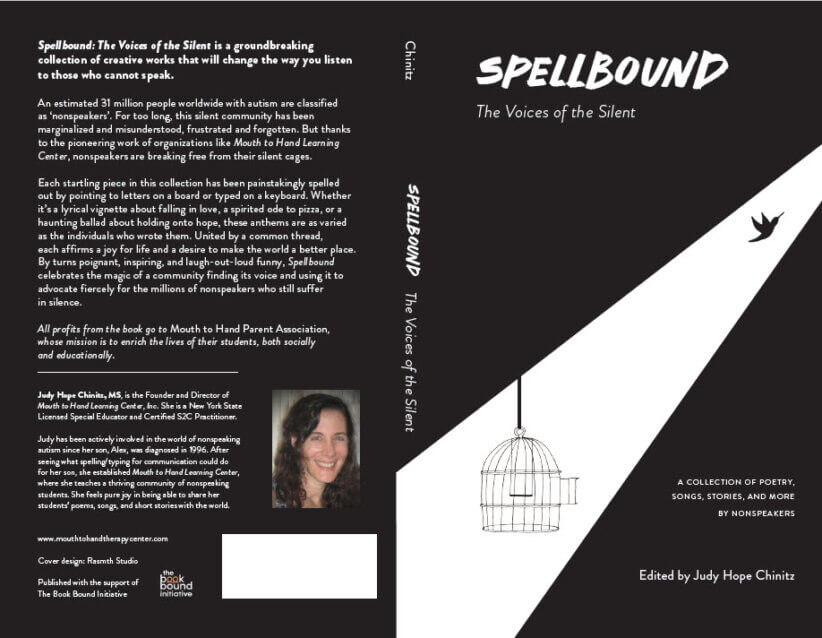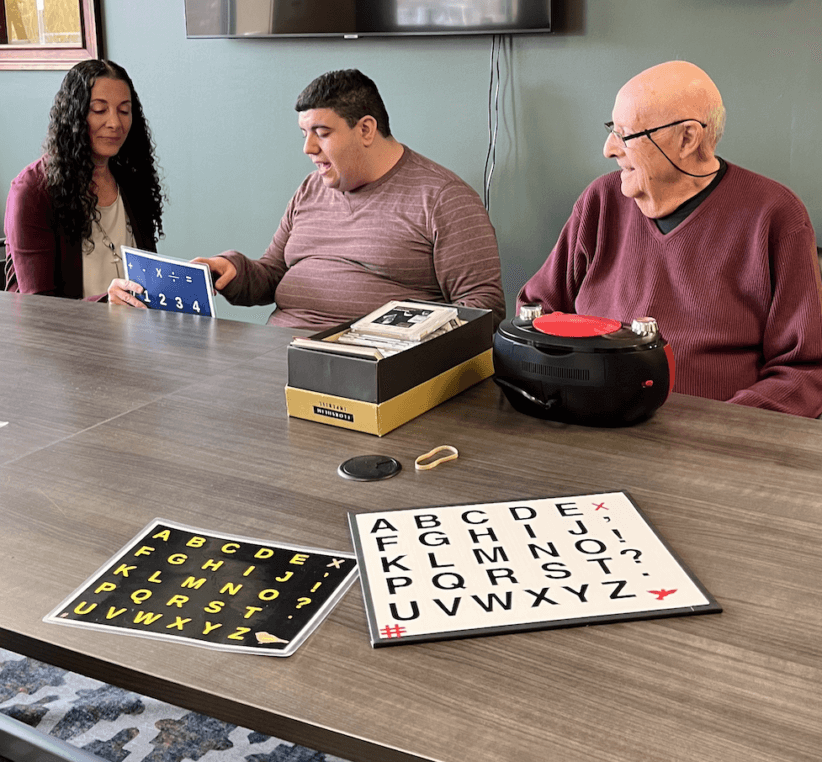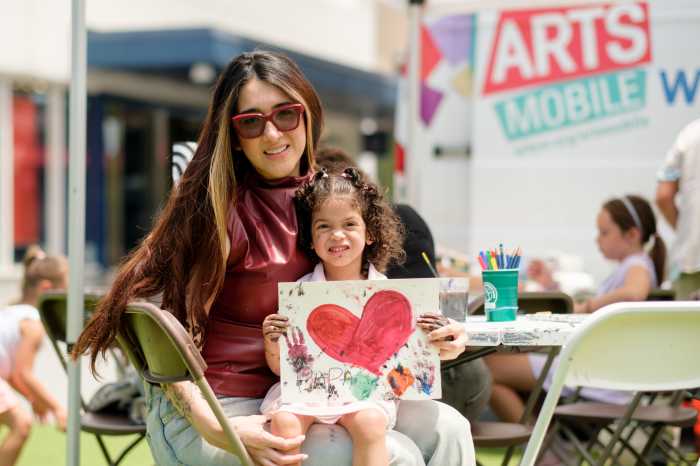
Meet Judy Hope Chinitz: Author and Special Needs Educator
In Westchester, Judy Hope Chinitz is doing incredible work as a special needs educator, working with non speaking autistic young adults and children. Inspired by her own autistic son who learned how to communicate by typing out letters, Judy has helped more than 50 students in her company, Mouth to Hand Learning Center, find their voice, and, incredibly, use their creativity to write lyrical vignettes, poems, songs, short stories, and more. This April, Judy is elated to share their voices in “Spellbound: The Voices of the Silent,” a collection of creative works spelled out by pointing to letters on a board or typed on a keyboard. Read on to learn more about Judy and her incredible line of work, and this inspiring new book.

Westchester Family: Tell us more about how you got into your line of work and working with non speaking autistic young adults and children?
Judy Hope Chinitz: I am a special education teacher and was originally trained in teaching the blind and visually impaired. However, several years after I graduated, my older son, Alex, was diagnosed with autism. I recertified and spent years working with both him and other students diagnosed with autism. In spite of my best efforts, I believed myself to have utterly failed him. Alex is completely nonspeaking, and he never seemed to learn anything. And yet, there were incongruities that puzzled me.
For example, he had a great sense of humor. The humor was physical slapstick, but still, it made no sense, since a sense of humor is a sign of high intelligence. Yet, his IQ had been “measured” at about 40 during school testing.
When he was 25 years old, a friend convinced me to take him to see a speech pathologist who was teaching non speaking students with autism and related disorders to communicate by typing out letters. I resisted as I believed Alex did not even know the alphabet but in the end, my friend’s persistence prevailed. I went into those sessions with enough skepticism to fill an ocean. What I saw there convinced me just enough to decide to commit to a six-month experiment. I’d work with Alex every day for six months: and if, in the end, he learned nothing, I could lay the whole thing to rest.
However, within four months of daily work, he began to independently “talk” to me in normal, conversational English. And I realized then that everything I thought I knew about non speaking autism was wrong. These individuals are not cognitively affected: they are so severely motor impaired that they had no means of communication.
I completely changed everything – both Alex’s life and mine. I pulled him out of daycare and hired a wonderful young man to be his companion and tutor. In order to get the necessary accommodations needed to take the New York State high school equivalency exam, Alex was tested by a PhD psychologist who found him to be in the 99+ percentile of intelligence. He passed the exam with distinction and was accepted to college – we hope he’ll be able to begin school in the fall. And to give this gift to other families, I opened my business. Mouth to Hand Learning Center is the result of my need to change everything I did and believed, which were wrong.

Westchester Family: Tell us more about how you have helped autistic young adults and children communicate?
Judy Hope Chinitz: Once I saw, with my own eyes, that my own son could communicate freely and openly with this method – which completely changed both our worlds – I knew that I had an ethical responsibility to give that gift to others like him.
In May of 2020, right in the beginning of the COVID lockdown, I began to teach a few young adults, some of whom I had known since they were 2 and 3 years old. As those students mastered the technique, more families called. Still, at that time, I envisioned this as nothing more than a kind of “tutoring” sideline, as I still had another job.
Around April of 2021, the book, “Underestimated: An Autism Miracle,” by JB Handley, was published…and things really took off. I have now taught over 50 non speaking individuals to communicate via spelling and typing, and we are continually growing.
Westchester Family: Tell us more about “Spellbound: The Voices of the Silent” and what you hope readers will get out of it?
Judy Hope Chinitz: Many of my students have a superior command of language and are highly creative. They have a burning desire to learn. Bear in mind, though, that until they learned to spell/type for communication, they have no way of showing anyone that they are not cognitively impaired. They spend their school days in classes for that population. They are, therefore, not well educated. Now they cannot wait to learn – and that desire is like a magnet to the teacher in me! I began to teach them: literature, poetry, writing, music, etc. I joke to my parents all the time that I am finally making use of that Ivy League English degree! Then the dam burst and the creativity poured through.
A year ago or so, I suggested to the parents at M2H that we publish a book of their work and then fate intervened. It turned out a family member was friends with Fran Hauser aka our “book angel.” Fran came to meet some of my students, was stunned (as everyone is), and volunteered to help us. As to what we want readers to get out of it, I’ll quote some of my students. Says Terence Dervishi, “I hope that people will see us in a different light. I want people to realize that we are just like everyone else.” And this from Keith Makar: “I want to make them think twice before judging people.”
Westchester Family: What is the most surprising thing you learned from your students?
Judy Hope Chinitz: I’d say it’s their resiliency. I’ll illustrate this one with a story. Last year, in one of my poetry classes, we were studying the poem “The Light of Stars,” by Henry Wadsworth Longfellow.
It ends with this stanza:
O fear not in a world like this,
And thou shalt know erelong,
Know how sublime a thing it is
To suffer and be strong.
My students were incredibly moved – and it’s not hard to understand why. They have suffered, and are suffering, more than I can say. You will read some of their works devoted to this: how their bodies betray them, how they were trapped in a silent cage all their lives, how they lived alone inside themselves, unable to tell anyone that they are “in here.” They decided to write poems based on that idea of strength and what it means to them personally.
One of my very gifted students, Logan Harnisher, sat down to work with me and the first thing he said was “I can’t write a poem about strength because I am not strong.” I asked him why he believed that, to which he responded, “Because I feel everything so deeply.” I pointed out to him that in actuality, it is those who feel deeply and yet still find beauty and light in this world who are the strongest people on earth. Therefore, in actuality, he was one of the strongest people I’ve ever met. He was stunned: he’d never thought of it that way.
From that encounter, he wrote one of the poems in the book, “The Strongest,” which ends:
Those who feel the most and survive are the strong.
Those who suffer the most and laugh still are the strong.
Those who love the most and see the light of the world are the strong.
Those who were silent but still sing are strong.
We are strong.
These are the most resilient, the bravest, people I have ever met.
Westchester Family: What are your goals/hopes for the future?
Judy Hope Chinitz: I have so many, it’s hard to zero in on just one or two! I think my main one for this upcoming year is to continue to work on community integration. I am always looking for opportunities to have neurotypical people meet and talk to them. It is a life-changing experience for so many people because they so rapidly realize that they indeed were unconsciously judging based on outward appearance. While my students are non speaking, and yes, their bodies do things beyond their control. And then…you talk to them. Suddenly, you find that you forget that they are “disabled” and nothing matters but the incredible human being inside that body.
My best friend is a fifth grade teacher in a school in Rockland County. She had one of my students, Edison Lema, Zoom into the 5th grade classes to talk to the students about his experience, and to teach them to not judge based on simply what someone looks like. I got to see the faces of those students as they got to meet someone so different from them and yet, so the same.
The next thing we knew, they were flying up to the mike to ask him what books he likes, and what sports he watches, and cheering when they found out his favorite player on the Yankees is Aaron Judge. It was truly a testament to the power of communication: you meet someone and you talk to them, and suddenly, everything changes.
I want to continue to expand opportunities for my son and my students. I want to give them all the chance to have meaningful and fruitful lives. I want them to be happy.
Westchester Family: What are some common misconceptions about autism?
Judy Hope Chinitz: I believe that many people do not understand the the word autism is a simple description of a collection of symptoms: it describes people who have issues with language, social differences and repetitive behaviors/limited interests. But in actuality, it’s like saying “brown hair.” Everyone who has brown hair is not the same! There’s an old saying in the autism world, that if you meet one person with autism…you’ve met one person with autism.
Taking that concept one step further, autism is really not one thing. People who look and act completely differently can be given that same descriptive label.
My students do not have a language disability: they have a severe motor disability that prevents them from speaking with their mouths. We know that about 87% of individuals diagnosed with autism have motor issues.
Westchester Family: How can people work with you?
Judy Hope Chinitz: They can call us at (914) 241 2500 to work with me in Mount Kisco, or email me at info@mouthtohandlearning.com
Westchester Family: Anything else to add?
Judy Hope Chinitz: There is nothing my students love more than talking to people. Please come to visit us at Mouth to Hand Learning. If you have any interest in volunteering to teach my students something, please let us know. If you have an hour once a month to spend with my nonspeakers, please come. Just talk to them. Tell them about yourself: let them tell you about themselves. It will enrich your life as much, or even more, than it will enrich theirs. They are truly amazing human beings – and it is an honor to be their teacher.
“Spellbound: The Voices of the Silent” is out April 25th, 100% of the profits will go towards the Mouth to Hand Parent Association.
Learn more about Judy and Mouth to Hand Learning here.













